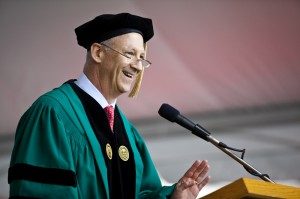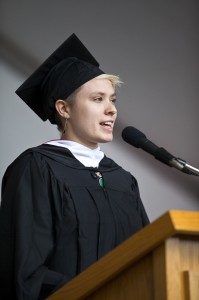
of the board, and CEO
of Panera Bread Company,
received an honorary degree and
delivered the keynote
Commencement address at
Clark University, May 18.
Clark University held its 110th Commencement on Sunday, May 18, awarding 511 bachelor’s degrees, 442 master’s, and 16 doctoral degrees. Students representing more than 80 countries began the traditional processional at noon, moving down a flag-lined pathway to their places under a tent on the campus green.
Ron Shaich ’76, founder, chairman of the board, and CEO of Panera Bread Company, received an honorary Doctor of Humane Letters degree and delivered the keynote Commencement address. “So here’s the question I would like to ask today: What really matters in creating a successful career and a successful life?” Shaich asked the Class of 2014. “If there’s one lesson that I take from my 30 years as a business builder, it is this: Knowing what matters dramatically increases the probability that you will produce the outcome you desire.
 “Over the years, I’ve come to believe a Clark education is powerfully different,” Shaich continued. “At far too many schools, students are taught what to think. Clark is an exception, because Clark taught us how to think. … Clark taught us that, to arrive at better answers, we must first ask better questions. A provocative question pushes us to dig deep and do the hard work of challenging convention and changing the world.”
“Over the years, I’ve come to believe a Clark education is powerfully different,” Shaich continued. “At far too many schools, students are taught what to think. Clark is an exception, because Clark taught us how to think. … Clark taught us that, to arrive at better answers, we must first ask better questions. A provocative question pushes us to dig deep and do the hard work of challenging convention and changing the world.”
* Congratulations Class of 2014! To see Clark Commencement photos, click here. *
Shaich recounted how he started an on-campus convenience store during his junior year at Clark, a store “run by and for students — and suddenly I found myself in business. To my great surprise, I found creating a business to be the most creative experience of my life.”

the annual Senior
Address:”We must break
from our comforts,
and realize that
we are stronger
without them.”
Today, Panera is ranked among Fortune’s “World’s Most Admired Companies.” In 2010, Shaich spearheaded the Panera Cares initiative, which created nonprofit community cafes to ensure that anyone can get a meal in a dignified dining environment and to raise awareness about food insecurity in our country. “Panera Cares is our modest attempt to make a difference in people’s lives,” he said. “But successfully making a difference starts with learning.”
Shaich concluded: “For many of you today, this ceremony marks the end of your formal education. Clark University has prepared you to think, it has prepared you to continue to learn, and it has prepared you to act. Now it’s up to you. As you embark on your life after graduation, I challenge you to do the work that matters. Do that, and you will have truly learned what matters to living a life well.”
Emma Pierson, of Brooklyn, N.Y., presented the annual Senior Address. “I arrived at Clark University with its slogan ringing in my ears: Challenge Convention. Change Our World,” she began. Pierson, who majored in English with a minor in geography, talked about the transformative discomfort she experienced when she began training as a member of the Clark swimming and diving team, and how her commitment to rigorous workouts helped strengthen both her body and mind.
“My point is not that we must all be athletes, but that we must not veer away from what is different, difficult, or dark. No, not at all. Rather, we must go toward what is different, explore what is dark, taste how bitter it is, and feel how vast. … We must break from our comforts, and realize that we are stronger without them.”
Michael Crow, president of Arizona State University, spoke at the master’s and doctoral degree-granting ceremony. Crow, who is nationally recognized for innovative leadership and his commitment to a “reinvention” of the American research university model, lauded Clark University for charting a different academic path. He advised the new graduates that rather than simply be critics of the status quo — “Critics are weaklings,” he insisted — they should examine the underlying design that caused the flaws in the current system, attack the problem from that perspective and foster change “at the conceptual level, at the design level and at the implementation level.”
Crow concluded with a quote from the Roman philosopher Cicero, “I criticize by what I create.” He then told the graduates, “Go out and change things.”
Crow received an honorary Doctor of Humane Letters degree, as did Cynthia Enloe, research professor in Clark’s International Development, Community, and Environment Department and a renowned feminist teacher and researcher on women’s politics.
Speaking to the bachelor’s degree recipients and their families, Enloe asked the graduates to think about the teachers at Clark who have inspired and changed them. “You’ve had dozens of terrific teachers during your years here. And those teachers have engaged you with a wide range of styles. Some have been quiet, subdued, but you’ve hung on every word. Others have been more dramatic, lighting sparks,” she said.
She challenged the graduates on the count of three to “say one professor’s name out loud!”
Enloe’s invitation was met with a heartfelt roar of teachers’ names.
In closing the bachelor’s degree ceremony, Clark University President David P. Angel told the graduates, “We hope as you leave here today and take the next step in your life, that you will continue to live our motto to Challenge Convention and Change Our World. May you approach your work with empathy, energy, courage and compassion. … In the spirit of Clark’s original motto — Fiat Lux — you are now ready to move on and bring light to our world.”
* Congratulations Class of 2014! To see Clark Commencement photos, click here. *
Founded in 1887 in Worcester, Massachusetts, Clark University is a small, liberal arts-based research university addressing social and human imperatives on a global scale. Nationally renowned as a college that changes lives, Clark is emerging as a transformative force in higher education today. LEEP (Liberal Education and Effective Practice) is Clark’s pioneering model of education that combines a robust liberal arts curriculum with life-changing world and workplace experiences. Clark’s faculty and students work across boundaries to develop solutions to complex challenges in the natural sciences, psychology, geography, management, urban education, Holocaust and genocide studies, environmental studies, and international development and social change. The Clark educational experience embodies the University’s motto: Challenge convention. Change our world.
